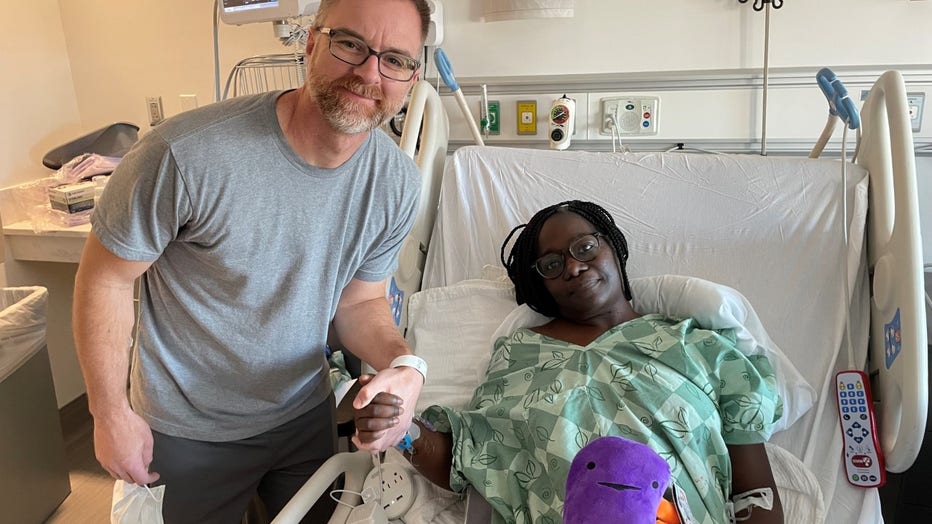Miles apart, coworkers team up to help a colleague get a lifesaving transplant

Man donates kidney, saves co-worker's life
Three coworkers who live hundreds of miles apart consider each other family now. One is in Georgia, the others in Florida and Oklahoma. Before the pandemic, they knew each other professionally, but not really personally. That changed last summer.
ATLANTA - Last summer, Jeanine Ramirez felt like was feeling like her life was winding down. The Atlanta woman had been struggling for three years with end-stage kidney failure.
"My kidney function started declining pretty rapidly, and I was placed on dialysis," Ramirez says.
Ramirez was 45, working remotely for Cancer Treatment Centers of American (CTCA), raising a teenage daughter, and trying to find a kidney donor.
By July, she was running out of time.
"My nephrologist told me that I did not have much longer because my functioning was going really fast, and dialysis wasn't slowing it down or anything," Ramirez remembers. "So, I started making end-of-life preparations."
Ramirez shared the news with Jane Bridges, a CTCA coworker working remotely from her home in Florida.
"She says, 'Jane, I've got 1 to 6 months to live, my doctor just told me,'" Bridges says. "And, it broke my heart."
Bridges had never met Ramirez in person, but immediately checked to see if she could donate a kidney.
"I'm diabetic, and that's one of the criteria that they say, 'Nope, sorry,'" she says.
So, Bridges wrote an email.
"And, I sent out to, I think, it was about 220 of my contacts within CTCA," she says.
"I said, "Could you please, if you or anybody that you know that might be willing to donate, could you go out and see if you can donate?"
In Tulsa, Oklahoma, Jimmie Deibert, a CTCA pharmacist read the message.
"It took me by surprise; I had no idea," Deibert remembers.
The 45-year-old married father of two had been working with Ramirez remotely for more than a decade, and he felt like the email was intended for him.
"Within about an hour and a half, in fact, I went on the Emory Transplant page to start the process," he says.
Deibert started the screening process, and in late September, he sent Ramirez a message, asking if she could talk.
"His first words were just, 'I'm a match.'" Ramirez says. "I remember questioning, 'A match for what?' I remember just bawling and crying, and sharing it with my daughter. We both were just a ball of mush, because it was hard to believe that I had a match. But, then it was the second hump of, 'Will this person still go through (with it)?'"
The answer came early on the morning on November 11, 2021, at Emory University Hospital.
"I was literally sitting, praying, 'Lord, please let him show up,' Ramirez says. "And, sure enough, the elevator dinged, and I didn't turn around, I was just kind of meditating. Then I heard his voice, and I just let out this big sigh."
That day, one of Deibert's two kidneys was removed and carefully sewn into Ramirez.
"The doctor said his kidney started working immediately on the table," she says. "By the next morning. I literally could feel a brightening up. I won't say energetic, but I just felt good. It was a weird feeling of good, because I hadn't felt good in years."
Deibert says the experience changed him.
"How many people get the opportunity to save someone's life and do it in such a real way like that," he asks. "I felt like it was an honor for me."

Jimmie Deibert and Jeanine Ramirez at Emory University Hospital.
Jeanine Ramirez has taken her second chance and run with it.
"I can keep up with my 17-year-old daughter, which I haven't done in years," Ramirez says. "I'm walking to the front of my subdivision now, which is about a two mile, two and a half mile walk. I'm not winded."
Jane Bridges, the coworker who made all of this happen, flew up to take care Ramirez after her surgery.
That is when they finally met for the first time.

